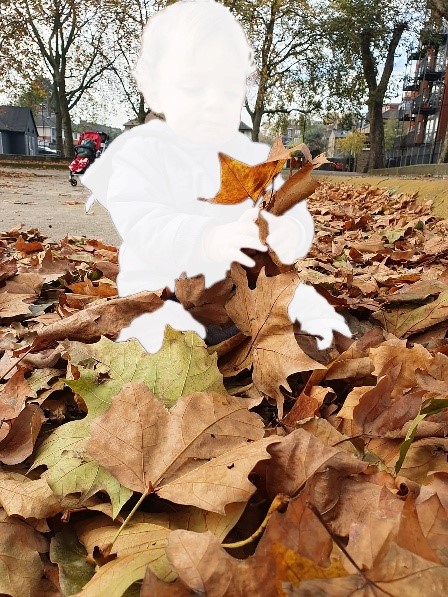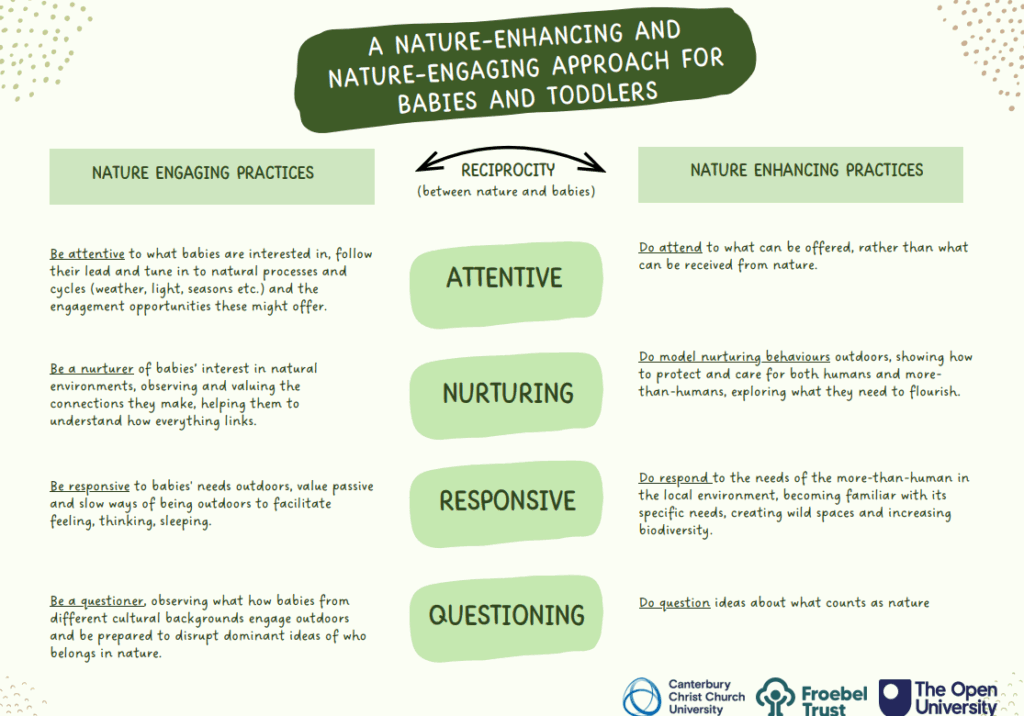EECERA Conference 2025 – Guest Blog # 31: Where are the babies outdoors?
Posted 23rd August 2025
One of a series of short blog posts by presenters who will be sharing their work at the upcoming annual conference in Bratislava, Slovakia. Any views expressed in this post are those of the author(s) and do not necessarily reflect the official stance of their affiliated institution or EECERA.
babyNENE: a framework for developing more inclusive nature-based pedagogies for babies
by Joanne Josephidou, Nicola Kemp and Polly Bolshaw

Figure 1: Images by Alice Marcelino for A Froebelian inspired nature pedagogy in urban babyrooms, licensed under CC BY-NC-ND
Where are the babies outdoors?
Five years ago, we found ourselves asking ‘Where are the babies?’ (Kemp and Josephidou, 2020) as we reviewed international literature about up to twos outdoors as part of a research project funded by the Froebel Trust. As we come towards the end of our second funded project, we now have a good understanding of where they are, and why these ‘tiny humans’ may not be seen as belonging outdoors, particularly in urban areas (Kemp, Josephidou & Bolshaw, 2025). To support the development of more inclusive nature-based pedagogies for babies and toddlers we have developed a framework for practitioners – babyNENE. It is a framework which also is supportive of both the adults they spend time with and the outdoor spaces they spend time in. We hope to discuss this framework with you at EECERA 2025 but offer you an overview here; do please join us if you can.
The highly skilled work of the Baby Room practitioner
As increasing numbers of babies attend daycare settings, there is a necessity to consider more critically the interactions that are supported both indoors and outdoors (Guard, 2023). Looking after babies can be stressful, it is emotionally demanding work (Goouch and Powell, 2012) and can impact negatively on practitioner wellbeing. It is highly skilled work even if it is not always recognised as such. The early childhood research community is becoming steadily louder in asking questions about quality and provision for babies (sf Sakr et al., 2025) although outdoor provision remains less well understood and valued.
Outdoor spaces and outdoor pedagogies for babies
Babies can benefit holistically from being outdoors (Kemp, Josephidou & Bolshaw, 2025). In our ongoing analysis of data from a parental survey and visits to five urban settings, we have found that the spaces available and routines which must be followed, including a strong emphasis on health and safety, contribute to outdoor spaces being ‘artificial, flat and bounded’ (see our forthcoming report ‘Looking for the wow and wonder’). Parents may rely on the setting to take their child outside, but getting outdoors and consistently spending time ‘in and with nature’ (Froebel, 1826, p. 30) can be challenging for practitioners who are not necessarily provided with appropriate practical and emotional support such as clothing or places to sit where they can easily engage with the children. The focus of our research was to explore how urban settings could be encouraged to develop outdoor spaces and pedagogies that were inclusive for babies, benefited biodiversity and supported practitioner wellbeing.
babyNENE
NENE (Nature Engaging and Nature Enhancing) pedagogy is a concept we developed to speak to the needs of both the child (baby and toddler) and the environment (Josephidou and Kemp, 2022), following the findings from an initial project (Froebel Trust | A life ‘in and with nature?’ An exploration of… ). During our second project (Froebel Trust | A Froebelian inspired nature pedagogy in urban… ), babyNENE has developed from the fledgling concept of NENE, as we have narrowed our focus to babies and worked with practitioners, and with expertise from the Derbyshire Wildlife Trust, to co-construct a practitioner toolkit. By creating a space that is beneficial to humans, both young and old, more-than-human life can also begin to thrive. This is done by greening the area, spending time there, and noticing what nature, and babies, need to thrive.

Figure 2 The initial NENE concept
Our research has raised important questions about the multiple layers of exclusion that can operate even before birth (Kemp, Josephidou & Bolshaw, 2023). babyNENE offers a means of interrupting some of the current practices with babies, the expectations on practitioners and consideration for the environment.
Dr Joanne Josephidou: OUPPS (Open University People Profile System)
Polly Bolshaw: Ms Polly Bolshaw – Canterbury Christ Church University
Dr Nicola Kemp: Nicola KEMP | Canterbury Christ Church University, Canterbury | Department of Childhood Studies | Research profile
References
Froebel, F. (1826) The Education of Man. Translated by Jarvis 1885. New York: A. Lovell and Company.
Goouch, K. and Powell, S. (2012) The Baby Room. Maidenhead; OUP.
Guard, C. (2023). ‘It’s the little bits that you have enabled me to see’. Reconceptualising the voices of babies using the video interaction dialogue model with early years educators. Early Years, 43(3), 606–625. https://doi.org/10.1080/09575146.2023.2190498
Josephidou, J. and Kemp, N. (2022) ‘A life ‘in and with nature?’ Developing nature engaging and nature enhancing pedagogies for babies and toddlers’, Global Education Review.
Kemp, N. and Josephidou, J. (2020) Where are the babies? Engaging the under twos with the outdoors. The Frobel Trust. Available from: http://oro.open.ac.uk/69869/ 9
Kemp, N., Josephidou, J. and Bolshaw, P. (2023) From weeds to tiny flowers. Available at: Froebel Trust | A Froebelian inspired nature pedagogy in urban…
Kemp, N., Josephidou, J. and Bolshaw, P. (2025) ‘Tiny humans’ outdoors: understanding the factors that mediate opportunities for babies and toddlers. Children’s Geographies, 23(2), 219–236. https://doi.org/10.1080/14733285.2025.247968
Sakr, M., Bonetti, S. and Halls, K. (2025) Quality in the Baby Room: Actionable Findings from a Global Evidence Review. Available online: www.thebabyroom.blog/report-1
Joanne Josephidou, Nicola Kemp and Polly Bolshaw will present work referred to in this blog in Symposium Set C20 (Wednesday, the 27th of August). (Schedule liable to change; please refer to final programme for details).
